
The Pakistan Armed Forces are the military forces of Pakistan. It is the world's sixth-largest military measured by active military personnel and consist of three formally uniformed services—the Army, Navy, and the Air Force, which are backed by several paramilitary forces such as the National Guard and the Civil Armed Forces. A critical component to the armed forces' structure is the Strategic Plans Division Force, which is responsible for the maintenance and safeguarding of Pakistan's tactical and strategic nuclear weapons stockpile and assets. The President of Pakistan is the Commander-in-Chief of the Pakistan Armed Forces and the chain of command is organized under the Chairman of the Joint Chiefs of Staff Committee (JCSC) alongside the respective Chiefs of staffs of the Army, Navy, and Air Force. All branches are systemically coordinated during joint operations and missions under the Joint Staff Headquarters (JSHQ).

Rawalpindi is a city in the Punjab province of Pakistan. It is the fourth most populous city in Pakistan and third most populous in Punjab according to 2017 Census. It is located near the Soan River. Rawalpindi is situated close to Pakistan's capital Islamabad, and the two are jointly known as the "twin cities" because of the social and economic links between them.

General Jehangir Karamat is a retired four-star rank military officer, diplomat, public intellectual, and a former professor of political science at the National Defense University. Prior to serving as a Chief of Army Staff, he also served as the 9th Chairman of the Joint Chiefs of Staff Committee from 1997 to 1998.
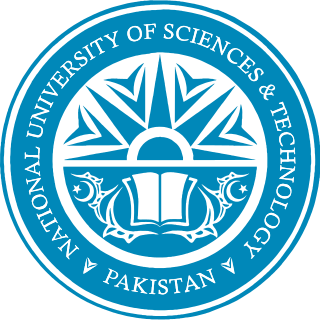
The National University of Sciences & Technology (NUST) is a Pakistani multi-campus public research university with its main campus in Islamabad.
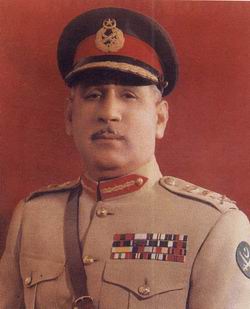
Tikka Khan was a Pakistani military officer who served as the first chief of the army staff from 1972 to 1976. Along with Yahya Khan, he is considered a chief architect of the 1971 Bangladesh genocide which according to independent researchers led to the deaths of 300,000 to 500,000 people.

The Chief of the Army Staff (COAS) is a statutory office held by the professional head of the Indian Army (IA), the land forces branch of the Indian Armed Forces. Customarily held by a four-star general officer, the COAS is the senior-most operational officer of the IA, tasked with the roles of overseeing the overall functioning of the force during peace and wartime, committing to the preparation-cum-maintenance of the force's operational effectiveness and defending the nation's territorial integrity-cum-sovereignty. Also a permanent member of the Chiefs of Staff Committee (COSC) and the National Security Council (NSC), the COAS also bears the responsibility of advising the nation's civilian leadership i.e., the Government of India on all matters privy to the IA.

The Pakistan Army, commonly known as the Pak Army is the land service branch and the largest component of the Pakistan Armed Forces. The president of Pakistan is the supreme commander of the army. The Chief of Army Staff (COAS), a four-star general, commands the army. The Army was established in August 1947 after Pakistan gained independence from the United Kingdom. According to statistics provided by the International Institute for Strategic Studies (IISS) in 2023, the Pakistan Army has approximately 560,000 active duty personnel, supported by the Pakistan Army Reserve, the National Guard and the Civil Armed Forces. Pakistan Army is the sixth-largest army of the world and the largest of the Muslim world.
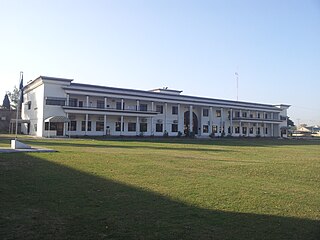
The Military College of Signals, also known as MCS, is a military school located in Rawalpindi, Punjab, Pakistan. It is a constituent college of the NUST, Islamabad. MCS consists of two engineering departments, EE & CSE. The college puts a strong emphasis on scientific and technological education and research.

The National University of Modern Languages (NUMLs) (Urdu: قومی جامعہ جدید زبانیں) is a multi-campus public university with its main campus located in Islamabad, Pakistan and other campuses in different cities of Pakistan.

The Manohar Parrikar Institute for Defence Studies and Analyses (MP-IDSA), New Delhi, is India's foremost think tank for advanced research in international relations, especially defence, strategic and security issues, and providing training to civilian, military and paramilitary officers of the Indian government. It is funded by the Indian Ministry of Defence but operates as a non-partisan and autonomous body. It aims to promote national and international security by carrying out research on defence and security-related issues and disseminating the knowledge among the policy-makers and wider public.
General Khawaja Ziauddin Abbasi, also known as Ziauddin Butt, is a retired four-star rank army general in the Pakistan Army, who served as the Chief of Army Staff (COAS), for few hours, until Chairman joint chiefs General Pervez Musharraf reasserted the command and control of the military despite his termination on 12 October 1999.

The Armed Forces Institute of Pathology is the main Pakistani institution for defensive research into countermeasures against biological warfare. It is located in the vicinity of CMH Rawalpindi alongside the Armed Forces Institute of Cardiology in Rawalpindi Cantt, Punjab, Pakistan. Established in 1957, the AFIP, supported by civilian and military pathologists, has been engaged in the task of combating virus outbreaks in Pakistan.

Combined Military Hospitals are Pakistan Armed Forces hospitals situated in various cantonments of Pakistan.
The Combined Military Hospital Rawalpindi is a tertiary care military hospital in Rawalpindi. It is headed by a Major General from the Army Medical Corps (Pakistan). It provides specialized treatment to the armed forces personnel and their immediate families.

Civil–military relations describes the relationship between military organizations and civil society, military organizations and other government bureaucracies, and leaders and the military. CMR incorporates a diverse, often normative field, which moves within and across management, social science and policy scales. More narrowly, it describes the relationship between the civil authority of a given society and its military authority. "The goal of any state is to harness military professional power to serve vital national security interests, while guarding against the misuse of power that can threaten the well-being of its people." Studies of civil-military relations often rest on a normative assumption that it is preferable to have the ultimate responsibility for a country's strategic decision-making to lie in the hands of the civilian political leadership rather than a military.
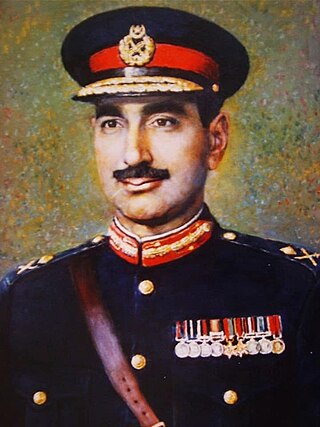
Major General Raja Muhammad Anwar KhanHJ was the first Pakistan Army Engineer Officer and the first Muslim Engineer In Chief of the Pakistan Army. He was the first Muslim to be a Sapper officer in the British Indian Army and its pre-partition Indian Corps of Engineers. His Pakistan Army number was 48 (PA-48).

Lieutenant-General Mushtaq Ahmad Baig HI(M) was the surgeon general of the Pakistani Army until his death from a suicide-bomb attack on 25 Feb. 2008. He was an ophthalmologist by profession. Baig is the oldest senior Army officer to be targeted and killed since Pakistan's involvement in the War on Terror and the North West-Pakistan Conflict. He is the most Senior Pakistan Army General to have died in war since the death of Major General Iftikhar Khan Janjua in the Battle of Chamb.

Ayub National Park, commonly known as Ayub Park or, historically, Topi Rakh Park, is a national park located on the Grand Trunk Road, not far away from the old presidency in Rawalpindi, Punjab, Pakistan.
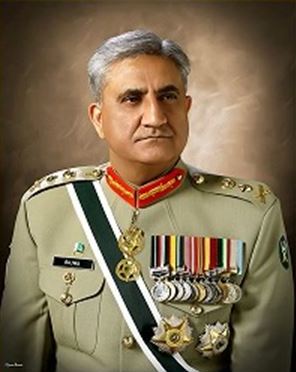
Qamar Javed Bajwa is a retired Pakistani army general who served as the tenth chief of the army staff of Pakistan from 29 November 2016 to 29 November 2022. In 2018 he was ranked 68th in the Forbes list of the World's Most Powerful People.

Syed Asim Munir Ahmed Shah NI(M) is a Pakistani army general and the current Chief of Army Staff since 29 November 2022. Before becoming the army chief, he was posted at the GHQ as Quartermaster general. He commanded the XXX Corps in Gujranwala from 17 June 2019 to 6 October 2021. He served as the 23rd Director-General of the ISI until he was replaced by lieutenant general Faiz Hameed on 16 June 2019. Munir received the Sword of Honour for his performance as a cadet in the Officers Training School, Mangla.


















